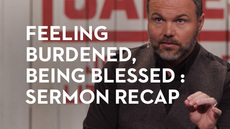Be patient, therefore, brothers, until the coming of the Lord. See how the farmer waits for the precious fruit of the earth, being patient about it, until it receives the early and the late rains. 8 You also, be patient. Establish your hearts, for the coming of the Lord is at hand. 9 Do not grumble against one another, brothers, so that you may not be judged; behold, the Judge is standing at the door. 10 As an example of suffering and patience, brothers, take the prophets who spoke in the name of the Lord. 11 Behold, we consider those blessed who remained steadfast. You have heard of the steadfastness of Job, and you have seen the purpose of the Lord, how the Lord is compassionate and merciful.
12 But above all, my brothers, do not swear, either by heaven or by earth or by any other oath, but let your “yes” be yes and your “no” be no, so that you may not fall under condemnation.
Introduction
Command. Law. Obligation. These are not popular words in our culture. But our response to a demand varies depending on whom it comes from. If you were new on a job and someone you’d never met came into your workspace and began giving commands, you may comply but not gladly. It’s not easy being bossed around by a stranger. Consider another scenario: a loving father, who has obvious affection for his kids, stoops down, looks his child in the eye and says, “It’s time to put away the toys, and start on your chores.” The difference between the two is one of relationship. The child has obligations around the house as a member of the family. He knows he’s loved by his dad and is glad to represent the family name by doing what kids in his family do. They help around the house.
In our Bible study, it’s often helpful to think in familial terms. The Apostle James is a concerned, loving, fatherly pastor. If we fail to see the book of James in this light, the kind of life James calls us to will seem like burdensome obligation. Theologically, these distinctions help us to understand the difference between the “indicative” and “imperative.”
The New Testament writers often use indicative statements to reveal a fact. Things like what God has done for his people, such as save them from their sins, in Jesus, or the things he will do for them, in the future, like give them eternal life. The New Testament also uses imperative statements as a way of commanding an appropriate response. Indicatives of Scripture (what God has done) make it possible for hearers to obey imperatives of Scripture (what they should do). When we misunderstand these distinctions, the believer’s obligation to obey can become a cold, dutiful checklist of dos and don’ts.
James’ words are saturated with the indicatives of what God has done and what God is going to do in the future. He will return, and patience comes from living a life that looks forward to this reality. James gives three examples of patient endurance—the farmer (v. 7), the prophets (v. 10), and Job (v. 11).
Observation
- How many times does James address his hearers as “brothers” in these verses? What does this tell you both about his tone and his affection for his audience?
- Job was a “blameless” and “upright” man, always careful to avoid doing evil yet was afflicted in almost every way (Job 1:1). What does James remind the audience about God’s character (v. 11)? How might that enable them to remain patient? How does Job’s story encourage us?
- In James 5:7–12, both negative imperatives involve sin from our mouth (v. 9, 12). In verse 12, James says, “Above all things do not swear, either by heaven or by earth or by any other oath.” What does James say will happen to those who profane God’s name? Rather than oath taking, how does God ask us to speak? How does faithfulness to our words reflect God’s character to others?
Interpretation
- Read James 5:7. Although James uses the word “wait,” farmers must labor prior to waiting for the rains by tilling the ground and carefully planting seeds at the correct depth. With that in mind, how does the farmer encourage us to “wait” for the Lord’s return? What does Luke 12:43 call the servant who is found working when the Lord returns?
- Read Luke 9:51–56. The word “establish” in James 5:8 is the same word for “set” used in Luke 9:51. What does James point to that makes it possible for the hearers to establish their hearts?
- What does God say is the result of grumbling against another? (v. 9) Read 2 Corinthians 5:10. Although believers won’t be condemned upon Christ’s return, how will we be judged? What might we lose on Judgment Day?
- The Old Testament commands God’s people to take oaths and swear by his name (Deut. 6:13–14), but cautions them to be quick to fulfill the conditions they swear by or be found guilty. By New Testament time, many scribes and Pharisees were teaching an elaborate system of binding and nonbinding oaths. These oaths were designed to seemingly fulfill the outward requirements of the law while missing the true spirit of oath taking—living a life before God. Read James 5:12 and Matthew 5:33–37. How does keeping eternity in view help believers with inward obedience? Why should oath taking be unnecessary for a believer?
Application
- What circumstances tend to reveal your lack of patience? What actions or attitudes in response to difficult circumstances communicate your lack of trust in God? What lies about God do you need to confess? What Scriptures will you memorize about God’s character to help you persevere in difficulties?
- When others oppress us, we are likely to vent our frustrations to those around us. In what ways have you sinfully judged God or others by grumbling or complaining? How might you differently involve God and others when facing suffering?
- We might call ourselves or others blessed when free from trials or suffering, yet James calls people blessed “who remained steadfast” (v. 11). How has looking to circumstances rather than in the nearness of Christ robbed you of the joy and peace found in him? How does keeping your focus on God’s character allow you to remain steadfast in the midst of suffering?
- In verse 12, James says “Above all . . . let your yes be yes and your no be no.” Is it difficult for you to make and stick to commitments? If so, why? How does breaking your word distort the image of God you bear?
This devotion is adapted from the James Study Guide. Pick up a copy today for only $9.99. The Study Guide includes a 15-week curriculum, a small group study, a group inductive study, as well as 75 daily devotions for your personal or family worship.
















